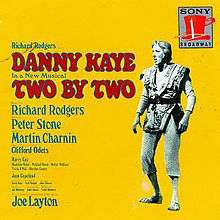Two by Two (musical)
Two By Two is a Broadway musical with a book by Peter Stone, lyrics by Martin Charnin, and music by Richard Rodgers.
| Two By Two | |
|---|---|
 Original Cast Recording | |
| Music | Richard Rodgers |
| Lyrics | Martin Charnin |
| Book | Peter Stone |
| Basis | Clifford Odets's play The Flowering Peach |
| Productions | 1970 Broadway |
Based on Clifford Odets's play The Flowering Peach, it tells the story of Noah's preparations for the Great Flood and its aftermath.
Directed by Joe Layton, the production opened on November 10, 1970 at the Imperial Theatre, where it ran for ten months. The opening night cast included Danny Kaye, Marilyn Cooper, Joan Copeland, Harry Goz, Madeline Kahn, Michael Karm, Tricia O'Neil, and Walter Willison.
Production
Reviews were mixed, and Kaye, unhappy with the script, began to improvise on a nightly basis. His ad-libbed shtick and comic asides to the audience. When he broke his foot, Kaye continued with the show, appearing at each performance either on crutches or in a wheelchair.[1]
"He appeared with his leg in a cast and either rode around the stage in a wheelchair — in which he sometimes would try to run down the other actors — or hobbled around the stage on a crutch — which he used to goose the girls," wrote Rodgers in his autobiography Musical Stages. "In addition, he began improvising his own lines and singing in the wrong tempos. He even made a curtain speech after the performances in which he said, 'I'm glad you're here, but I'm glad the authors aren't.' Apparently there was a certain curiosity value to all this, because people actually went to see Two by Two because of Danny's one-by-one vaudeville act. Others, of course, were appalled and expressed their irritation in letters to the [New York] Times."[2]
The show is frequently performed by community theatre and church groups, and there have been a few noteworthy revivals over the years. Milton Berle headed a production at the St. Louis Municipal Opera (The Muny) in 1971. Shelley Berman headed the show's National Touring company in 1972–73, co-starring Taina Elg as Esther. More recently, Tom Bosley sang Noah's role for a soundtrack slated for a (canceled) 2001 U.S. national tour of the show. Jason Alexander has been seen in the role in Los Angeles' "Reprise" production as well in New York's York Theatre "Musicals-in-Mufti" production directed by Martin Charnin. Walter Willison (the original Broadway "Japheth") has also appeared as Noah in the 2002 Richard Rodgers Centennial concert for the Jewish Repertory Theater Off-Broadway (which he also directed) and in regional productions of the show in recent years.
Awards
Kaye's lack of professionalism and Rodgers' public grousing about the liberties he took with the script allegedly ruined Kaye's chances for a Tony Award nomination.[3] Willison was nominated for a Tony Award for Best Featured Actor in a Musical, and he and O'Neil received Theatre World Awards for their performances.
Plot synopsis
On his 600th birthday, Noah receives a message from God, warning him about the impending flood. He is directed to save two of each animal and to build an ark for them. Noah's wife and family have their doubts and even make fun of him as he plans to build the ark, but join in when the animals start to appear en masse. "The story dealt with Noah and the flood, and though written in 1954, covered such contemporary themes as the generation gap and ecology," Rodgers wrote. "There was even a parallel between the flood and the atom bomb."[4]
- The gitka
The "gitka" is a magical Old Testament species of rodent, created by Clifford Odets, that sings in the presence of God.[5] The arrival of one convinces the family of Noah's story. It has no mate so they are unable to bring her aboard.
Songs
|
|
The songs "Everything That's Gonna Be Has Been," "Getting Married to a Person," "The Brother Department," "The Death of Me" and "Forty Nights" were cut from the show prior to its Broadway opening; the latter song was cut because Danny Kaye decreed that no one in the show would have a funnier song than he. The song has been restored to many recent revivals.
Notes
- Hischak, pp. 298-299.
- Rodgers, Richard. Musical Stages: An Autobiography. New York: Random House, 1975.
- Hyland, p. 297.
- Rodgers, Richard. Musical Stages: An Autobiography. New York: Random House, 1975.
- Two by Two on The Guide to Musical Theatre
References
- Jackson, Arthur (1977). The Best Musicals from Show Boat to A Chorus Line. Crown Publishers. ISBN 0-517-53122-4.
- Hischak, Thomas (2007). The Rodgers and Hammerstein Encyclopedia. Greenwood Publishing Group, ISBN 0-313-34140-0
- Hyland, William (1998). Richard Rodgers. Yale University Press, ISBN 0-300-07115-9
External links
- Two by Two at the Internet Broadway Database
- Two by Two listing at RNH
- Still Photographs from Two by Two from the NYPL Digital Gallery